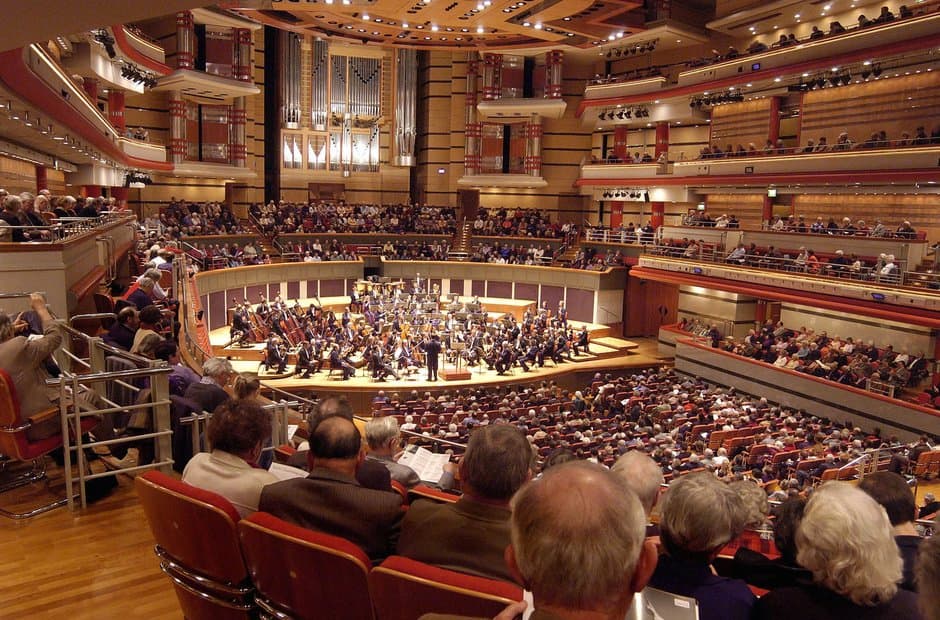It’s well known and acknowledged that the core audience for classical music is in the age range from c55 to 80+. These are the people with the money and, more importantly, the time to engage with classical music. Fretting about the age of classical music’s core audience, and the notion that classical music is “dying” (it’s not, it really isn’t!) is a perennial activity for marketing people, orchestra CEO’s, venue managers et al. There’s a palpable, almost gnawing desperation around classical music in the UK as if it’s continually gasping for life due to a lack of “young people” in the audience. Yet, the situation has not really changed in years: despite Leonard Bernstein’s best efforts to attract younger people to his concerts in the 1960s, the core audience tended to be people over 50 – and that trend continues today.

Birmingham Symphony Hall
This obsession with attracting a young audience seems to be exclusive to classical music:
“Do manufacturers of Range Rovers, organisers of river cruises, bespoke tailors and proprietors of Michelin-starred restaurants sit around panicking over their lack of appeal to the crucial 18-25 demographic?” – Richard Bratby (British classical music journalist) on Twitter
It is also well known that engaging with classical music, especially in the live concert setting, requires a degree of patience. Older people tend to have more time and, therefore, a greater inclination to engage with classical music. In addition, there is something about being a bit older that makes the experience of a classical concert feel more appealing than other kinds of concerts; perhaps this age group would prefer not to go to a concert where the music might be amplified or the venue over-crowded.
Of course we want to attract more people of all ages to classical music, but in the endless mission to tempt younger people, concert organisers, venue managers, orchestra CEOs and others run the risk of alienating their core audience in the process.
A recently released “vision statement” from the City of Birmingham Symphony Orchestra (CBSO) sets out a list of actions designed to entice and retain the audience (find the full statement here: https://cbso.co.uk/stories/a-new-vision-for-the-cbso). It’s replete with the fashionable vocabulary du jour – “immersive”, “accessible”, “transformative”, “empowering”….. While this may be well-meaning, there is a distinctly condescending “we know best” tone to some of the statements.
Audiences are, in general, smart and discerning. They don’t need to be told how to behave at a concert or how to listen to the music; they don’t need to be told what to wear or when to applaud. It’s presumptuous of organisations like the CBSO to declare that they will permit or empower their audiences to behave in a certain way. And I think such presumption is both off-putting and patronising to their core audience.
Ludwig van Beethoven: Piano Concerto No. 4 in G Major, Op. 58 – III. Rondo: Vivace (Philipp Scheucher, piano; Webern Kammerphilharmonie; Vladimir Kiradjiev, cond.)
Equally, this “we know best what’s good for you” tone is likely to alienate rather than entice the younger audience, along with gimmicks such as theatrical/staging techniques, film/video or lighting effects to “inform” the music and “to allow audiences to use their eyes as well as their ears,” (CBSO vision statement).
Activities to attract the younger audience should not be at the expense of the artform’s core audience. Instead, we should be celebrating and nurturing that core audience by giving them the concert experience they will enjoy the most – a welcoming atmosphere, interesting programmes of music presented without gimmickry, and, importantly, a sense of respect towards the audience from concert hosts, artists, and venue managers.
It’s also worth noting that older concert-goers can play a pivotal role in encouraging the next wave of music enthusiasts by sharing their knowledge and appreciation of the artform with younger people, for example, grandchildren.
“With old age comes wisdom, patience, subtlety, contemplation – all qualities needed to appreciate great and complex music,” – Sir Stephen Hough
For more of the best in classical music, sign up for our E-Newsletter
Claude Debussy: Suite bergamasque: III. Clair de lune (Stephen Hough, piano)




